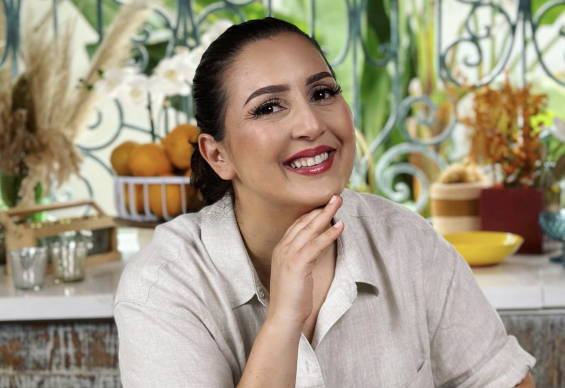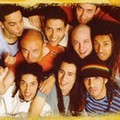Like many other young Moroccans studying abroad, Alia Al Kasimi missed the familiar flavors of Moroccan food, especially the dishes her grandmother used to make. While pursuing a degree in computer science in the USA, the young student, born in Rabat to an Iraqi father and a Moroccan-Algerian mother, decided to learn to cook from scratch.
In the early 2000s, when social media was still in its infancy, Alia decided to record a Baghrir recipe (a Moroccan type of pancake) and share it with her American friends. Who better to seek help from than her Moroccan grandmother, a well-known cook in Rabat who was often hired by local families to prepare authentic Moroccan dishes for weddings and other festivities?
«When I was a kid, I used to go with my grandmother to weddings. I was there with her for three days, eating and tasting. My grandmother was an amazing cook», Alia told Yabiladi in a phone interview.
But once she was in the US, Alia, who didn’t know how to cook, struggled to recreate some of the Moroccan dishes she grew up eating. «When my grandmother visited the US, she would cook a lot for me. But when I traveled back home, I’d take a lot of food and freeze it», the now mother of two recalled.
One day, Alia decided to film a video of her grandmother cooking Baghrir, so she could upload it to YouTube and learn the recipe herself while sharing it with her American friends. And so, «Cooking with Alia» was born—a YouTube channel that would surprise her with its success.
«My first video on YouTube was in 2007», Alia recounted. After posting it, she was surprised to receive messages from American women married to Moroccans, asking her to show them how to make more Moroccan dishes.
Learning in front of the camera
These women, eager to learn Moroccan cooking but faced with limited resources in English, found Alia’s channel to be a lifeline. But there was a catch: Alia herself didn’t know how to cook.
«They told me, ‘Just learn and teach us at the same time’», she joked. In addition to her studies, Alia embarked on a cooking journey. She called her grandmother and friends who knew how to cook, learned from them, and tried out recipes. She would experiment during the week, then film and post videos on weekends.

«I bought a camera with a cassette; it was the old days when we didn’t have good camera phones. I hired a student who knew how to edit—it was complicated—and then I had to leave a video uploading overnight. It took the whole night to upload the video», she reminisced.
Alia learned to cook Moroccan dishes in front of the whole world, through the videos she kept posting despite her hectic schedule as a consultant in New York. But her journey wasn’t always smooth.
«In the beginning, people weren’t very kind to me. Moroccans discovered my channel and started being mean», Alia recalled. «They used to tell me I didn’t know how to cook and that I was embarrassing them».
Alia almost gave up on cooking, but her husband reminded her of the community waiting for her videos and encouraged her to continue.
«My husband said something that stuck with me. At that time, Obama had just been elected for the first time, and he told me, ‘If the president of the US was elected with 51 percent, you only need 51 percent of people to approve of you. You don’t need 100 percent.’ I did have the 51 percent, especially with the American women married to Moroccan men—they were desperate and would take anything at that time».
Determined to keep going, Alia took her Moroccan cuisine journey more seriously. She took cooking classes around the world and in the US, and traveled to Morocco to meet Dadas, women who often play multiple roles within households, including preserving and passing down traditional Moroccan cuisine.

In 2013, one of Alia’s dreams finally came true when she was chosen to be the Moroccan chef judge on Master Chef Poland. «For me, that moment was very important because it was the opening scene of Morocco, and I said, ‘Welcome to Morocco, I’m going to show you Moroccan cuisine’».
«It was so important to fill that void. I felt like I had a responsibility to share Moroccan cuisine with the world», she said.
Alia later moved to South Korea, after earning an MBA from Berkeley, to work for Samsung. Despite her demanding job with long hours, Alia’s passion for cooking never faded. On the contrary, she continued making videos, filming, and cooking on weekends and nights.
While in the country, Alia participated in a cooking competition and made it to the finals, combining Korean and Moroccan cuisine. After several experiences on TV, Alia realized that she preferred social media, where she had first started.
«I like social media, and I like everything digital because I understand the power of social media, which basically eliminates the middleman», she explained.

The wife and mother then decided to take a year off to focus on her passion for cooking. «I had a lot of ideas, and during that year off, I started my company, which is a digital marketing company specializing in food marketing», she proudly recalled.
Her company remained within the cooking sphere, doing branding, strategy work, content creation, and everything digital for companies in the food industry.
AI and Moroccan cuisine
But with the emergence of Artificial Intelligence (AI), Alia had to use her business and cooking skills to ride the wave. In February 2023, she created the first cookbook of Moroccan recipes using AI, titled «Spice and Machine: 10 Moroccan Recipes Born from Artificial Intelligence». She presented the book in Saudi Arabia in October 2023.
«The book created unique Moroccan recipes. We asked ChatGPT to create Moroccan recipes, selected ten, and tested them—they were amazing», she explained. The recipes were original and creative, such as a mint tea cake that tasted like drinking tea while eating a cake, and Harira quiche, which combined the flavors of Moroccan soup with eggs.
Alia and her team also recently released another food-related book that offers tips on how to prompt ChatGPT to generate food styling pictures.
And since Moroccan food is always a top priority for her, Alia created «Flavors of Morocco», an online cooking school that teaches authentic Moroccan cuisine with the help of Dadas.
«Moroccan cuisine is passed down through generations, from mother to daughter, not through schools. These women don’t write these recipes down—they’re not sitting there writing them out».
The school now boasts 150 courses taught by the Dadas, complete with detailed recipes, videos, and beautiful photography. The courses are in English to cater to Alia’s loyal followers—English-speaking food aficionados who, due to the language barrier, cannot access resources on authentic Moroccan food.
 Dada Malika
Dada Malika
«Moroccans can always call their parents or go to YouTube, but the rest of the world—if they want to learn authentic Moroccan food—where do they go? That’s why we document Moroccan culinary heritage, even visually, with videos», she explained.
In addition to the online cooking school, Alia, through Flavors of Morocco, is creating the first AI influencer Dada: Dada Malika. «Our Dada will teach Moroccan cooking; she’ll be an influencer. She wears Moroccan attire and speaks as well», said the entrepreneur, now based in Lisbon, Portugal.





 chargement...
chargement...













